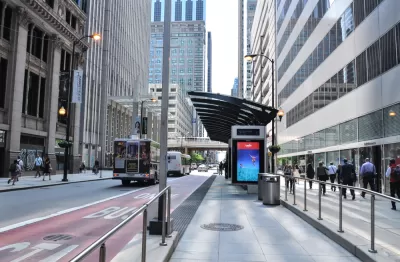In addition to funding the city's roadways and trains, Chicago could use new federal infrastructure dollars to shore up its bus system and invest in bus rapid transit that would improve service for riders.

In an opinion piece in the Chicago Tribune, Amy Rynell, executive director of the Active Transportation Alliance, argues that Chicago's efforts to revitalize its public transit system should focus on buses, particularly bus rapid transit (BRT). As Rynell writes, investing in BRT would bring other positive improvements to the city. "Investments in BRT often come with major upgrades for people walking and biking with wider sidewalks, protected bike lanes and stations that comply with the Americans with Disabilities Act. They spur neighborhood economic development, leading to more affordable housing and small businesses with access to rapid transit."
Rynell calls on city leaders to allocate more resources to bus service, asking "Why aren’t our transportation and transit agencies working together to pursue innovative, equity-focused investments in bus service?" Rynell then describes the city's failed Ashland Avenue BRT project, which she suspects is influencing the city's reluctance to invest in more buses. But Rynell argues in favor of reviving that plan, which was stopped due to opposition from local businesses. According to the article, the Ashland Avenue BRT plan was the most cost-effective proposal evaluated by the regional planning agency, and federal dollars could pay for a substantial portion of the cost of new BRT lines. In the meantime, Rynell also recommends upgrading service with dedicated bus lanes on the city's most-used routes.
FULL STORY: Op-ed: Revitalizing Chicago’s bus rapid transit system should start with Ashland Avenue

Montreal Mall to Become 6,000 Housing Units
Place Versailles will be transformed into a mixed-use complex over the next 25 years.

Planetizen Federal Action Tracker
A weekly monitor of how Trump’s orders and actions are impacting planners and planning in America.

DARTSpace Platform Streamlines Dallas TOD Application Process
The Dallas transit agency hopes a shorter permitting timeline will boost transit-oriented development around rail stations.

Interactive Map Reveals America's “Shade Deserts”
Launched by UCLA and American Forests to combat heat-related deaths, the tool maps the shade infrastructure for over 360 U.S. cities.

Bicycles and Books — In Sacramento, Libraries Now Offer Both
Adult library card holders can check out e-bikes and e-trikes for up to one week.

Colorado Landfills Emit as Much Pollution as 1M Cars
Landfills are the third-largest source of methane pollution in Colorado, after agriculture and fossil fuel extraction.
Urban Design for Planners 1: Software Tools
This six-course series explores essential urban design concepts using open source software and equips planners with the tools they need to participate fully in the urban design process.
Planning for Universal Design
Learn the tools for implementing Universal Design in planning regulations.
City of Mt Shasta
City of Camden Redevelopment Agency
City of Astoria
Transportation Research & Education Center (TREC) at Portland State University
US High Speed Rail Association
City of Camden Redevelopment Agency
Municipality of Princeton (NJ)



























